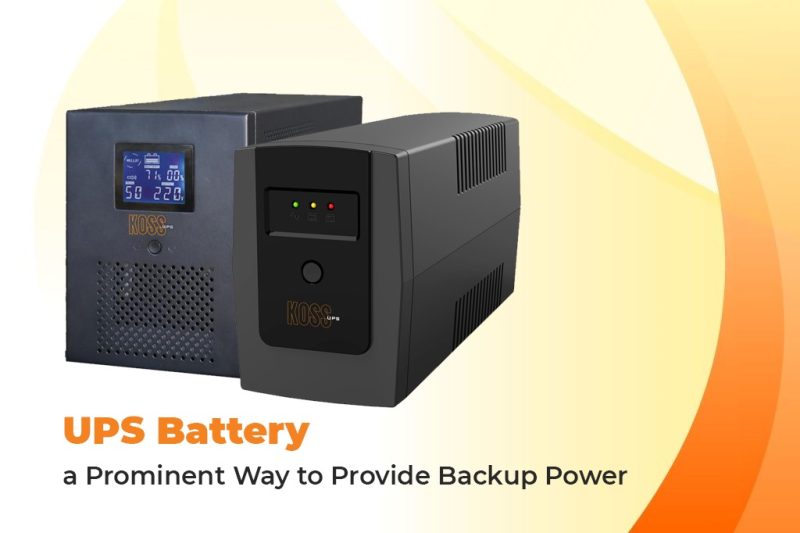
UPS system is the backbone of this technology-based world. UPS systems not only provide backup power but also protect critical equipment such as a series of surveillance or medical equipment from loss of coverage during a sudden power outage. UPS or uninterruptible power supply system is an electrical component that instantly responds to power unavailability. UPS System contains a battery that works as secondary backup power to the component. UPS battery refers to a stopgap between the backup power and the main power source. Some critical places like hospitals, data centers, and harsh industrial environments have zero tolerance for power outages or fluctuations. Sometimes UPS system may take a little time to respond to the outage, which can create huge chaos in these places. A reliable UPS battery is specifically designed to solve this problem by responding instantly, and allowing the UPS system to provide a big boost of power to the equipment.
Types of UPS Battery
There are 3 main types of UPS batteries available in the market.
Lead-Acid UPS Batteries- when it comes to an uninterruptible power supply system, Lead-Acid batteries have a clear and proven track record for reliability. In large power equipment, these batteries provide the most economical choice. These batteries are cost-effective for their low internal impedance and high tolerance qualities. Lead-Acid batteries generally come in two different types:
VRLA Batteries- These batteries are also known as SLA batteries. Valve-regulated lead-acid batteries are a type of lead-acid battery that is made up of a shorted amount of electrolytes soaked up in a plate separator. They are available in all voltages, shapes, and sizes. It is proven that valve-regulated lead-acid batteries are reliable to provide instant and smooth backup power to a UPS system connected to critical equipment. It is available at a lower cost. The foremost reason for its demand is its high tolerance, which means lower battery management requirements.
Open Valved Batteries- Known as Flooded batteries, these batteries contain plates, flooded with electrolyte acid. Open valve batteries have a long lifespan up to 20 years, which is double a UPS’s lifespan. These batteries aren’t sealed. Flooded batteries require more powerful ventilation systems and can pose a greater safety hazard.
Nickel-Cadmium UPS Batteries- These batteries are specially designed for telecom installations. Still, they can be used in UPS systems batteries containing electrodes made up of cadmium hydroxide on the negative plate and nickel hydroxide on the positive plate.
Lithium-Ion UPS Battery- A lithium-ion UPS battery is a rechargeable battery made of critical minerals such as lithium, cobalt, and graphite with high energy density and a lifespan of 9 to 10 years. It is an advanced battery technology that gets charged and discharged by lithium-ions that move between the negative to positive electrodes through electrolytes.
In this blog, we will cover the benefits of VRLA batteries and Lithium-ion UOS batteries.
Benefits of Using VRLA Battery
UPS systems come with a lifespan of 8 to 9 years. A VRLA battery is specially designed with a service life of almost 8 years which ensures no requirement of replacing the battery. VRLA batteries are totally safe to use in UPS systems because they are sealed and explosion-proof with the safety valve installation. The main issue a user needs to face while choosing a battery is the maintenance cost. Using a reliable VRLA battery can cut the maintenance cost because they are maintenance-free. Its charge retention ability is three times better than other batteries. VRLA batteries provide trouble-free and safe operation with their valve-regulated and spillproof construction and are famous for their easy handling quality.
Benefits of Using Lithium-ion UPS Batteries
As mentioned before, checking the lifespan of the UPS battery is salient. The lifespan of a lithium-ion battery is 9 to 10 years which means no maintenance cost because the continuance of a UPS system is 8 to 10 years. Also, a lithium-ion UPS battery takes only 2 to 4 hours to get fully charged from 0%. Flexibility always matters. Being lighter and smaller a lithium-ion battery offers more flexibility than other batteries. A lithium-ion UPS battery is at least 40% to 60% lighter and 70% smaller than other batteries, which means it provides the same or more power with less requirement of place. When it comes to safety, lithium-ion batteries are entirely safe to use for their ability to resist higher temperatures than other traditional, and there are no differences in the quality of performance. For their high-temperature resistance quality, these batteries are worthy to use in rasping industrial environments.
Since 1998 Power Logic has been operating. By understanding the changing needs of markets we have decided to provide comprehensive solutions that allow you to protect your most valuable assets - your computers and data. We have continued to develop unique products with our commitment and professionalism to establish our channel nationwide.UPS & AVR are the first products we developed. We have various ranges of UPS with capacities ranging from 800 VA to 480 KVA. We have several types of UPS that deliver reliable power and with real-time power management software, we can control and auto shutdown multiple servers. Besides that, Power Logic also has a wide range of UPS for industry use is three-phase True online UPS and N+X Modular type UPS. Power Logic Malaysia Top 100 industry, leading in the heavy-duty and high-performance industry for green power solutions.